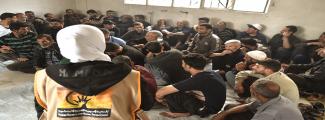People who fled East Ghouta certainly suffer considerably at the temporary shelters from inadequate living conditions, with all the stress which that situation entails. Therefore, based on one of SSSD’s basic goals in providing psychosocial support, our team working at the Adra and Najha temporary shelters, in cooperation with UNHCR, conducted a collective (open) activity entitled Arab Councils.
The activity was inspired by the concept of the local “councils” (majalis) of old, which used to play a crucial role in strengthening social ties, resolving differences and handing over customs and traditions from one generation to the next. On 4, 11 and 18 May 2018, both at Adra and Najah, a number of open sessions were held, which comprised 1,051 beneficiaries. People enjoyed conversation, poetry recitation, singing and dabkeh dancing. The beneficiaries prepared Arabic coffee, which is a symbol of strong social ties and a “pledge” that would encourage them to support each other under the current circumstances. Of course, the fun element was at the rendezvous too; the sessions invariably ended with the traditional Shami Procession.
The turnout was great and the interaction was positive par excellence. Many people expressed their desire to hold similar meetings with the SSSD team after their return to their homes. They also expressed their wish that SSSD should be present in every region of East Ghouta, as they truly appreciated the good treatment and the humanitarian sense that characterize our team.

